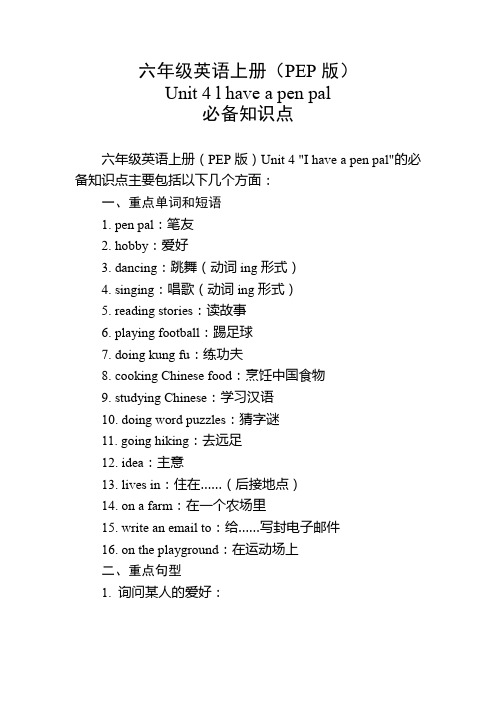六年级英语上册Unit4第四单元知识盘点
- 格式:ppt
- 大小:3.04 MB
- 文档页数:8

六年级上册英语第四单元知识点总结Unit 4 I have a pen pal一、重点单词和短语●pen pal 笔友●riding a bike(ride) 骑自行车●diving(dive) 跳水●hobby 爱好●watch (watches)TV 看电视●playing the pipa(play) 弹琵琶●listening to music (listen ) 听音乐●drawing pictures(draw) 画画 =painting (paint)●climbing mountains(climb) 爬山●playing (play)sport 做运动●idea 主意●studies 学习(第三人称单数)●forest 森林●gift 礼物●sometimes 有时●have to 不得不●get…from…,从……得到……●reading books 读书●read stories 读故事●do kung fu 练功夫●play sports 进行体育运动●sing English songs 唱英文歌●fly kites 放风筝●on a farm 在一个农场里●write an e mail to 给……写封电子邮件●on the playground 在运动场上●live in 住在……●play basketball 打篮球●play football 踢足球●go (goes) to work 去上班●go (goes) to bed 睡觉●go (goes) home 回家●teach(teaches) English 教英语●read (reads) newspapers 读报纸●go hiking 远足●study Chinese 研究中文●cook Chinese food 做中国食物●do word puzzles 猜字谜二、重点句子1.What's your hobby? 你的爱好是什么?=What is yourhobby?2.What are your hobbies? 你的爱好是什么?3.I like reading stories.我喜欢看故事书。

六年级英语上册(PEP版)Unit 4 l have a pen pal必备知识点六年级英语上册(PEP版)Unit 4 "I have a pen pal"的必备知识点主要包括以下几个方面:一、重点单词和短语1. pen pal:笔友2. hobby:爱好3. dancing:跳舞(动词ing形式)4. singing:唱歌(动词ing形式)5. reading stories:读故事6. playing football:踢足球7. doing kung fu:练功夫8. cooking Chinese food:烹饪中国食物9. studying Chinese:学习汉语10. doing word puzzles:猜字谜11. going hiking:去远足12. idea:主意13. lives in:住在……(后接地点)14. on a farm:在一个农场里15. write an email to:给……写封电子邮件16. on the playground:在运动场上二、重点句型1. 询问某人的爱好:What are sb's hobbies? 某人的爱好是什么?(sb's表示某人的,hobbies是hobby的复数形式)He/She likes reading stories and singing. 他/她喜欢读故事和唱歌。
注意:在回答时,如果主语是第三人称单数,like要变为likes,动词要用其ing形式。
2. 一般疑问句:Does he/she live in +某地? 他/她住在某地吗?肯定回答:Yes, he/she does.否定回答:No, he/she doesn't.Does he/she like doing sth.? 他/她喜欢做某事吗?肯定回答:Yes, he/she does.否定回答:No, he/she doesn't.3. 表达想要做某事:Do you want to +动词原形(+其他)? 你想要做某事吗?例如:Do you want to learn about robots? 你想要了解机器人吗?4. 征求意见:Shall we +动词原形(+其他)?我们……好吗?例如:Shall we dance? 我们跳舞好吗?三、语法点1. 动词的ing形式:用于表示正在进行的动作或习惯、爱好等。

Unit 4 Then and now单元知识整合+考点精练(含答案)一、语音er /ə/ teacher, farmer, sister, brother, summer, driver, worker, waiter, father二、必会词汇●四会单词ago······以前office 办公室newspaper 报纸news 新闻watch 观看e-book 电子书with用yesterday 昨天●三会单词use 使用,利用telephone 电话anywhere 随处,到处radio 收音机TV 电视still 仍然spell 拼读,拼写●短语then and now 过去和现在six years ago六年前do many things做很多事情write letters (to sb)(给某人)写信a mobile phone 一部手机call people anywhere 在任何地方给人们打电话listen to the radio 听收音机read newspapers for news 看报纸获取新闻on the Internet 在网上read e-books 看电子书make friends 交朋友do shopping 购物all over the world 全世界work hard努力工作on holiday 在度假invent the compass 发明指南针go on 继续look out of the window 朝窗外看spell the word 拼写这个单词get angry变得生气make a sentence with...用······造句wait for the answer等待回答三、核心句型1.Six years ago, I couldn't write.六年前,我不会写字。

译林版英语六年级上册第四单元知识点归纳Unit4 Then and now知识点归纳一、重点词组1.过去和现在then and now。
2.六年前six years ago3.做许多事do many things4.写信给他的朋友XXX his friends5.使用电话use the telephone。
6.在家at home7.在办公室in the office。
8.打电话给别人call people9.有一部手机have a mobile phone。
10.写电子邮件write emails11.听收音机listen to the。
12.读报纸read newspapers13.看新闻watch news。
14.在网上on the 15.读电子书read e-books16.在黉舍交同伙make XXX17.从商店里买工具XXX18.全世界all over the world。
19.在度假on holiday20.努力工作work hard。
21.我的堂弟my cousin22.每一天everyday。
23.向窗外看lookoutofthewindow24.听我说listen to me。
25.继续go on26.变得生机get angry。
27.用……造句make a XXX.期待谜底wait for XXX二、主要知识点1.本单元出现的一些介词的用法写…给…write…to…使用…做…use…to…听…XXX在网上XXX在XXX从商店里fromshops向窗外看XXX等待waitfor用make a XXX“egg”2.祈使句XXX to the。
否定句Don’t listen to the。
Make a XXX“egg”。
Don’t make a XXX“egg”.Please look out of the window。
Please don’t look out of the window.Sam。

pep小学英语六年级上册第四单元知识点UNIT4Ihaveapenpal一.单词Hobby['hbi]爱好rideabike--ridingabike骑自行车dive—diving跳水playtheviolin—playingtheviolin[,vai'lin]拉小提琴makekite—makingkite制作风筝collect[k'lekt]tamp[tæmp]—collectingtamp集邮fun快乐;乐趣with同…live–live居住teach—teache教go—goe去watch—watche看read—read读,看doedoen’t=doenot二.重点短语Gowimming去游泳rideabike骑自行车Litentomuic听音乐collecttamp搜集邮票WatchTV看电视makekite做风筝Playche下棋drawpicture画画Playfootball踢足球looktheame看起来一样Playtheviolin拉小提琴writeemail写邮件Gotowork去上班readnewpaper读报纸Gohome回家gotobed上床睡觉三重点句型What’yourhobby?你的兴趣/爱好是什么?Whataboutyou你呢?Whatdo/doeblike某人喜欢什么Iliketh我喜欢什么Behappytodoth高兴干某事三.重点语法1、动词变为动名词的规则:动词变为动名词,即是动词加ing。
一般要遵循以下三条规则:(1)一般情况下,在动词的后面直接加ing。
如:play—playingread—readingdo—doinggo—going(2)以不发音的字母e结尾的动词,要去掉不发音的字母e,再加ing。
如:write—writingride—ridingmake—makingdance—dancing(3)以单元音加单辅音结尾的重读闭音节,要双写最后一个辅音字母,再加ing。

3.They bring gifts for us. 他们为我们带来礼物。
解读: bring意思是“带来”。
该句型用于表达给某人带某物。
4.Merry Christmas! 圣诞快乐!解读: “Merry Christmas!”意思是“圣诞快乐!”,是圣诞节人们相互的问候语,答句也是“Merry Christmas!”5.We give our family and friends gifts, too. 我们也给我们的家人和朋友礼物。
解读: give意思是“给”。
give sb. sth. 和give sth. to sb. 都用于表达给某人某物。
6.Did Santa bring gifts?圣诞老人带来礼物了吗?解读:该句型用于询问某人过去是否做过某事,是含有实义动词的过去时态句子的一般疑问句。
7.He did bring gifts! 他的确带来礼物了!解读: did在该句中起强调作用。
助动词do放在动词原形前,加强该动作的语气,表强调。
8.I want to give my family something special for Christmas.我想送给家人一些特别的东西作为圣诞节的礼物。
解读: something表示“某事;某物”,是合成不定代词。
9.— How much for one, please? 请问,一个多少钱?— Five dollars. 五美元。
解读: how much 意思是“多少钱”时,可单独使用,也可构成词组how much money, 但英语中常省略money, 用来询问某物的价钱、价格。
10.I work and work. 我做啊做。
解读: “work and work”表示“做啊做”,表示动作一直持续。
四、开拓眼界 春 节春节是中国民间一年中最隆重的传统节日。
时间在夏历元旦,即正月初一。
汉族地区,节日活动历来从除夕开始直到正月十五。
届时,家家清洁盛装,合家团聚,拜谒尊长,吃团圆饭;贴春联,放爆竹,跳狮子,舞龙灯,亲友互访,相祝拜年等等。
六年级英语上册(新起点)Unit 4 Feelings必备知识点六年级英语上册(新起点)Unit 4 Feelings的必备知识点主要包括词汇、句型、语法和文化语境等方面。
以下是对这些知识点的详细归纳:一、词汇本单元涉及大量描述情感的词汇,学生需要掌握这些词汇的拼写、发音和含义。
以下是一些核心词汇:scared [skeəd] 害怕的worried [ˈwʌrid] 担心的angry [ˈæŋɡri] 生气的proud [praʊd] 自豪的;骄傲的sad [sæd] 难过的excited [ɪkˈsaɪtɪd] 激动的happy [ˈhæpi] 高兴的ill [ɪl] 不舒服的win [wɪn] 获胜race [reɪs] 赛跑find [faɪnd] 发现cry [kraɪ] 哭because [bɪˈkɒz] 因为test [test] 测验competition [ˌkɒmpəˈtɪʃn] 竞赛hurt [hɜːt] 弄伤二、句型学生需要掌握并运用以下句型来表达和询问情感:1. 描述情感的句型:I feel scared/worried/angry/proud/sad/excited/happy.You look sad/happy/angry in this picture.2. 询问情感的句型:How do you feel today?Why do you look sad/happy/angry?3. 表达原因的句型:Because I can't find my dog. It makes me cry.I am proud because I won the competition.4. 其他常用句型:It makes me laugh/uncomfortable.I hope we will be friends.I had a good/bad day today.三、语法本单元的语法重点包括:1. 形容词的用法:学生需要学会使用形容词来描述自己的情感状态,如happy、sad、excited等。
六年级英语上册(精通版)Unit 4 January is the first month.必备知识点六年级英语上册(精通版)Unit 4 "January is the first month"的必备知识点涵盖了月份、节日、核心词汇、拓展词组、核心句型以及日常交际用语等方面。
以下是对这些知识点的详细归纳:一、月份词汇January(一月)February(二月)March(三月)April(四月)May(五月)June(六月)二、节日词汇及日期New Year’s Day(元旦):January 1st(1月1日)Spring Festival(春节):usually in January or February(通常在一月或二月)Tree Planting Day(植树节):in March(在三月,具体日期可能因地区而异)Labour Day(劳动节):May 1st(5月1日)Mother’s Day(母亲节):on the second Sunday of May (五月的第二个星期日)Children’s Day(儿童节):June 1st(6月1日)Father’s Day(父亲节):on the third Sunday of June(六月的第三个星期日)三、核心词汇tree(树)grass(草)stop(停止)egg(蛋)back(回原处;后面)their(他/她/它们的)四、拓展词组the first month of the year(一年里的第一个月)the second month of the year(一年里的第二个月)the third month of the year(一年里的第三个月)the fourth month of the year(一年里的第四个月)the fifth month of the year(一年里的第五个月)the sixth month of the year(一年里的第六个月)五、核心句型1. There are twelve months in a year.(一年有十二个月。